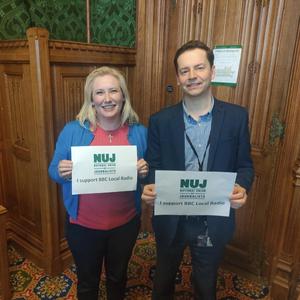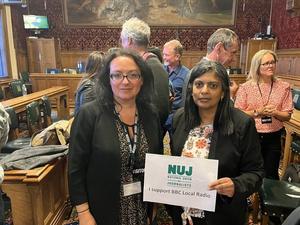MPs back BBC Local
“We stand with you, we support local radio.” This was the message that MP after MP stood up and delivered to NUJ BBC members at a lobby of Parliament on Wednesday 7 June.
More than 30 BBC Local members made the journey to Westminster to meet directly with local MPs, with politicians of all parties turning up in huge numbers to support their local radio services. Among those in attendance were Bernard Jenkin, chair of the influential Liaison Committee, Labour shadow culture minister Stephanie Peacock, and Lib Dem Sarah Olney – even Jacob Rees Mogg came to speak to the NUJ, among dozens more MPs.
Addressing the lobby, NUJ general secretary Michelle Stanistreet, said: “I pay tribute to the thousand NUJ members who got up this morning and instead of going to work went to a picket line.
“It’s not a decision any journalist wants to take” she continued. “I know NUJ members would much rather be reporting the news today and keeping their local communities up to speed and informed, rather than being the subject of headlines and news bulletins themselves.
“But this dispute has happened because journalists across BBC Local have been left with little choice. Because they care passionately about the role that local public service broadcasting plays in the lives of the local communities they are proud to serve.”
Political support
MPs queued up to add their support to NUJ’s campaign to save BBC Local.
“The Director General and BBC are making a mistake and they are going to regret it” said Emma Hardy to those assembled in the packed committee room 10. The Labour MP for Hull West and Hessel joked that she and fellow MP Dianna Johnson had “done the impossible” in getting all the MPs for Humberside to agree on something. They had hosted a meeting with BBC DG Tim Davie just the day before, in which MPs from various parties grilled the BBC boss and made clear that they and their constituents did not support cuts to BBC Local.
Mike Penning MP, Hemel Hempstead, said: “Everybody feels that the BBC has mishandled this. If it’s about money, this doesn’t save much, it’s tiny. Listeners trust local radio in a way they don’t trust national radio. They understand the local topography.” Mike said he’s seeking a further backbench debate and other opportunities to raise the issue of BBC Local cuts in parliament.
Sarah Olnie, MP for Twickenham and Richmond, paid tribute to NUJ rep Susana Mendonca, saying “I know Susana and others from BBC Radio London have been fighting really hard. In London we have the greatest diversity and range of communities and it’s those and often the most disadvantaged who are listening to local radio. Local radio is the primary source of news for many and that’s why it’s so important. We want to report the diverse experiences and that’s what BBC local radio does and why I’m here supporting you.”
John McDonnell, Labour MP and secretary of the NUJ’s cross party parliamentary group, said he was “cheesed off” with the BBC attitude. “You’ve got cross-party solidarity because we value you all so much. We’ll keep the pressure on and you have 100% solidarity.”
Ian Mearns MP for Gateshead said he had noticed when output was disrupted by NUJ strike action in March, with his local service switching to Leeds – “not my patch”. He warned: “Without that local knowledge, we’re losing a lot here. People are embedded in listening to their local radio output – they’re not dying away either, especially given the demise of so many local papers recently.” And he finished with a hopeful message, saying: “You absolutely have my support and hopefully we’ll see some change of decisions by the BBC.”
Rebecca Long-Bailey, MP for Salford – “the home of the BBC in the north”, said: “People are very angry because they can see the damage that this will do to democracy. We’ve seen the eradication of local media in Salford. We don’t have a print newspaper, we don’t get coverage of the planning notices or holding MPs to account. Please don’t hesitate to ask us to do something, because we will be there.”
Voices of journalists

Gerry Jackson, NUJ member from BBC Look North in Newcastle, met seven local MPs during the lobby session and was pleased with the response he got. “We want more online, but not at the expense of local radio, which is the Cinderella service and costs pennies” he said. “It’s not been us dragging our feet, it’s been the BBC. Very little of Look North’s content is available online. The north is one of the most digitally excluded areas of the UK. So what does it say to that area and others?”
Karen Gardner, NUJ rep at BBC Wiltshire, said: “My patch is considered quiet. During the Novichok story – I did 16 hours straight, on 5 Live, radio 4 and TV. When the national correspondents arrived, I gave them all the contacts, even told them where to park. You only get with local knowledge.”
Dan from BBC Coventry and Warwickshire, spoke passionately about local radio content, saying: “I’ve worked up from the bottom and now have my own show. I love it, it’s all about my local area. I’m passionate about my local area and especially my town of Rugby. But my show is going to go. I don’t know when, no-one’s told me.” He went on to speak about one of his listeners, Yvonne. “She said one night she was so low she would have taken her own life if it hadn’t been for my show. That’s the impact local radio can have.”
Wesley Mallin from BBC Derby made an emotional contribution describing the impact that cuts and uncertainty is having on BBC Local staff. “I’d like a week when I don’t have a colleague in tears leaning on me. Because they come to their NUJ rep, and that’s me” he said.
Wesley also shared a story of a listener, Alan. “Alan is a listener of mine, he’s blind. He’s in his 80s and he often phones up the newsroom asking for football scores. He called me last week wanting to complain, but he was only being directed online to complain. I will take Alan’s call, transcribe it, go to his house for him to sign it and I’ll help him send it. Because he’s our listener.”
BBC Hereford and Worcester sports correspondent Trevor Owens – an NUJ rep for 24 years, said “I’ve got colleagues in their 20s at work in tears because they don’t know if they can cover their mortgages.” Trevor challenged whether the BBC knows what BBC Local staff do. “I’ve uploaded over 850 videos to the BBC H&W Sounds channel and yes we do need digital in sport, but they don’t even know what we do now.”
Alan Webber, BBC Lincolnshire, said; “Regional shows won’t have the relatability that local ones do and listeners will switch off. If the BBC wanted to destroy local radio, this is a good way of going about it.”

Rupa Huq MP and Susana Mendonca, NUJ rep
Accessibility in focus
Sarah, a visually impaired activist, said: “Radio is very important to me. BBC Sounds isn’t very accessible for a visually impaired person. BBC radio kept me going through lockdown. I was shielding on and off for two years” she broke off briefly while overcome by emotion, before saying: “We need to keep local radio local.”
Sarah was backed up by her colleague, another Sarah, who revealed that “no equality impact assessment has been done on these changes.” She continued: “There are so many lonely people who are connected through local radio, they flick a switch and they’re connected through radio. I would request an investigation.”
Hope
Michelle Stanistreet thanked everyone for coming and for the words of support. “This is one of those rare campaigns that unites across parties” she said. “We take great heart from the support given here today and hope that you can help to move the BBC away from these damaging cuts.”
Find out more about the NUJ's campagn to keep BBC local radio local.
